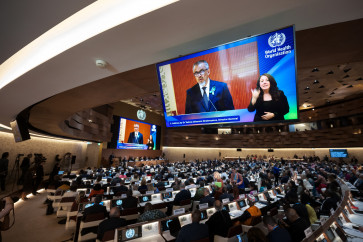Misbach Yusa Biran: A love-hate relationship
JP/Dian KuswandiniThese days, perhaps, some of us feel like choking every time we spot a new movie with a cheesy title and a plot involving gory ghosts, tacky humor and obscenities
Change text size
Gift Premium Articles
to Anyone

JP/Dian Kuswandini
These days, perhaps, some of us feel like choking every time we spot a new movie with a cheesy title and a plot involving gory ghosts, tacky humor and obscenities.
Well, legendary cineaste Misbach Yusa Biran shares the same feeling.
Having witnessed the ups and downs of the Indonesian film industry for the past 50 years, Misbach is one of the very few people who can share many stories about the industry with you — and certainly more than you might get from any textbooks. And once he starts telling a story, the 77-year-old is unstoppable.
“Our film industry is facing a setback — if we judge from most movies screening today,” said the man who was behind the country’s film documentation center Sinematek Indonesia. “It’s like we’re going back to the 1970s, where exploitive, adult-themed movies hit their big time.”
When Misbach started directing in 1955, he recalled that no one in the local film industry wanted
to be involved in a movie with sexual content.
“Around the 1950s and 1960s, no actors and actresses wanted to act in such a movie,” revealed the husband of veteran actress Nani Widjaya. “They would be ashamed if they did so.”
But things quickly changed when foreign movies invaded local theaters in the 1970s. Threatened by fierce competition, just like today, local producers decided to go for the same formula as their foreign rivals.
“They wanted to survive — so they created adult-themed movies too.”
Misbach, however, refused to be part of that batch. In 1971, he made a big decision: He stopped directing movies.
“I just couldn’t keep up with the trend. I was very frustrated with that environment,” said Misbach, who won several scriptwriting awards. “So, I decided to write scripts only — but just for a limited number of movies that suited me.”
This didn’t deter Misbach from contributing to the film scene. For him, there were many other ways to show his devotion — without having to sacrifice his idealism. So, right after making that big decision not to direct movies anymore, Misbach worked on establishing Sinematek Indonesia with his late author friend Asrul Sani, who was also a movie director. In 1975, the center was inaugurated, making it the first and only archive center for Indonesian films — until today.
“Films shouldn’t be just a medium for entertainment; they should be a medium to explore ideas,”
Misbach, who led Sinematek until 2005, said. “Films should nurture people. That’s why I think it’s important to document Indonesian films in Sinematek. The center will give future generations a place to learn.”
Misbach’s concern for the future of Indonesia’s film industry and society didn’t stop there. Since 1973, he has been coaching young creative talent — although he says it was more like “an accident.”
At that time, he actually wanted to study films at the Jakarta Arts Education Center (now the Jakarta Arts Institute or IKJ). But an old friend, late famous cineaste Syuman Djaya, who was the dean of the center’s Cinematography Academy, asked him to teach scriptwriting instead.
“I refused the offer, because even though I had hands-on experience, I had no [educational] background in scriptwriting. I taught myself the skills,” Misbach recalled. “But Syuman insisted, saying: ‘Just go and teach. You can read some books!’” he laughed.
So, he finally accepted the offer, thinking that teaching young talents was necessary to “build their character and idealism”.
“Making movies is all about talent — I admit that,” he said. “But if we could hone the talents in the right environment, I believe they could grow faster and better.”
“Just the same as someone who’s a talented singer. That person would progress faster if he or she learned the right vocal techniques, right?” Misbach said.
Apart from that, he went on, educating young talent means introducing them to “a horizon” in cinematography.
“Perhaps you can distinguish between filmmakers who went to a film school and those who didn’t,” Misbach said. “Those who studied cinematography tend to appreciate films more. They consider films as more than just entertainment — they regard them as a medium for arts.”
As a result, he continued, “they will produce good quality movies that could win the audiences’ heart.”
He cited as an example Riri Riza’s and Mira Lesmana’s bestselling movie Laskar Pelangi (The Rainbow Warriors).
“You don’t see any obscenities in that movie. No violence, no sexy women… only a bunch of kids,” he said. “But still, it attracted thousands people. Do you know the secret of its success?
“That was simply because the movie could move audiences’ hearts,” he said. “So it doesn’t take all those obscenities or violent acts to make a succesful movie.”
Although Misbach admitted that he himself hadn’t gone to a film school (as there was no film institute back then) that would teach him how to produce good quality movies, he said he grew up in an environment that supported artistic talent. This, Misbach said, inspired him to work in the film industry based on his passion — not financial rewards.
“I went to a high school where there were many talented students,” he said. “They painted a lot,
sang all the time and put together theater plays.
“I later joined the school theater and directed my own play — that was when I started to dream of working in the film industry,” added the former chairman of the Television and Film Employees Organization.
Misbach was indeed serious about his dream. In 1954, he joined Perfini studio, which was led by late legendary cineaste Usmar Ismail. It was the place where Misbach’s idealism was nurtured.
“Perfini wasn’t like other studios only focused on making profits. That was why I was interested in joining it,” said Misbach, who started his career as an assistant director.
His career later progressed — he started writing and directing one movie after another, including Ayahku (My Father), Macan Kemayoran (The Kemayoran Heroes), Bintang Ketjil (A Little Star) and Holiday in Bali.
Today, more than a half century after he started his career, Misbach is still enthusiastic about the film industry. He still coaches young cineastes, as well as translates and writes books on films.
Recently, the father of actresses Cahya Kamila and the late Sukma Ayu just re-released his book Teknik Menulis Skenario Film Cerita (Techniques of Script-Writing) — a comprehensive piece published by IKJ’s School of Film and Television. During the book’s launch, attended by his old friends and students, Misbach exerted his usual charm sharing his thoughts on the film industry.
Sitting on a wheelchair, the old man spoke in a very low voice, saying that he didn’t expect too much from people who read his book.
“I don’t except money or anything else from this book,” Misbach said. “But if my book can advantage others, then I just hope it can be my good deed in life.”









